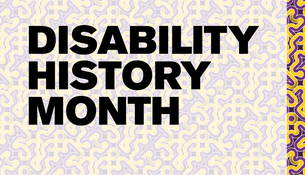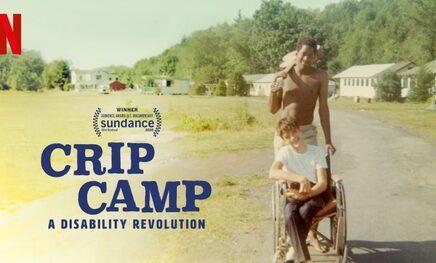|
In December 2021 DMU celebrated Disability History Month with an exciting and inclusive line-up of virtual and in-person events. As part of the programme, The DocHub hosted a screening of the documentary Crip Camp: A Disability Revolution (2020), directed by a former camper, Jim LeBrecht, and Nicole Newnham. We commissioned DMU’s Film Reviewing Society to submit a review of the documentary with the winning entry by Kick de Brabander featured as The DocHub’s inaugural blog post. Dear ‘Normal’ People An American summer camp away from society where minorities are treated equal. Minority and majority are binary opposites. When relating these terms to humans, it makes us all divided, black and white, colourless. Every one of us is different and should be treated equally; being normal just does not exist. The definition of ‘normal’ differs depending on the person you ask. This opposition of ‘not normal’ and ‘normal’ is placed unknowingly in our minds by societal standards. We are told by the police that the colour of your skin may mean that you are more dangerous, by society that we should always strive for more money, and by the world that it is an imposition to design cities that are accessible for wheelchairs. If this made you mad, good. Anger is what helps people stand up to unfairness. Of course, when we are told about these societal discriminations we do not always listen, but doing nothing is not enough. If anger ignites our fuses, getting together is what starts a real fire. One such fire started when the largest group of minorities in America came together as kids for a fun summer camp, run by hippies in 1971. The documentary that splendidly portrayed the rage of these kids is Crip Camp: A Disability Revolution (2020). Written, directed, and produced by Nicole Newnham and James LeBrecht, this film is an excellent depiction of these emotions through the perspective of people with disabilities. Using present day interviews with people reminiscing over Camp Jened; the summer camp where they felt most at home, whilst the narrative takes us back in time through old footage that was made at the camp in 1971 and news reports on later protests in the ‘90s. When the teens first arrived at the camp, you could feel how uncomfortable these kids were and talking about their lives on the camera you find out why they would feel this way. On the old footage they told their stories and how they felt in a society which treated them different from everyone else. This was true because the Americans with Disabilities Act (ADA), which prohibits discrimination based on disabilities, was not approved till 1990. Thus, before this there was a difference in how ‘normal’ people acted in front of people with disabilities. The ‘70s were harsh times, especially for kids with disabilities but funnily enough when they arrived at that camp everything switched. At this camp, they could be whoever they wanted to be without anything holding them back. They played games that they had not been allowed to play in mainstream schools, such as baseball and football. At Camp Jened they were treated like kids because that is what they were. Aside from the older footage, what also easily takes you back to the ‘70s is the music. With the opening credits playing For What's It Worth by Buffalo Springfield, it immediately puts you in that late ‘60s rock ambience. There was also another great moment with the song from Richard O'Brien, Sweet Transvestite. Campers were invited to a Halloween party, where they could dress up and get drunk. A stage was set up and an announcer called up Steven Hofmann, the song started playing and we see Steven dressed up as a woman, stripping off his clothes with a lot of pride. It is especially great when his quote is put beside him "If you're a handicapped person, and you happen to have a passive nature about you, you're really screwed." In contrast to the fun Camp Jened, a state hospital known as Willowbrook is shown through a news report. This is absolutely horrifying. For fifty disabled children there was one attendant, children were laying on the floor covered with their own excrement, almost starving because they could not feed themselves. It makes you wonder how many more horrible hospitals like Willowbrook are out there. These kids were treated as less than human. It is something you only want to see in horror films, because in reality it is too shocking. This documentary covers a serious subject whilst having some fun highlights and emotional moments. Crip Camp not only educates us about past problems, but also persuades us to be better in future. After ADA was declared in the ‘90s, disabled people celebrated it but weren't wholly satisfied. The ADA was only one step closer to a just world, however what these activists had to tackle now was the attitudes of non-disabled people. The prejudices of society must change because, in the words of Denise Sherer Jacobson, "you can pass a law, but until you change society's attitudes, that law won't mean much." This is what the film is trying to do, showing that humans with disabilities are humans too. Everyone really ought to see Crip Camp. It is an amazing story told by amazing people. We can all learn from it and, if we spread the message that it has and stop normalising those binary terms, then maybe we can all start living a 'normal' life. If communities of people are angry, we should take on that job to find out the reason for that unhappiness. If we understand it then we can help make the necessary change. Anger is a good thing, unrighteousness is not. So, let us build some fires with that anger and warm more people up. Changing their attitudes will change society's and make it a better place for us all. by Kick de Brabander  I was born in Venezuela (Caracas), raised on an Island in the Caribbean (Curaçao) and moved to the Netherlands to study acting. However, my love for films and the passion for creating stories was much greater than acting, and for that reason I moved to Leicester to study Film at De Montfort University.
0 Comments
Leave a Reply. |



 RSS Feed
RSS Feed